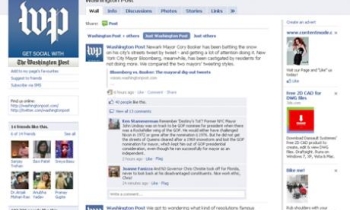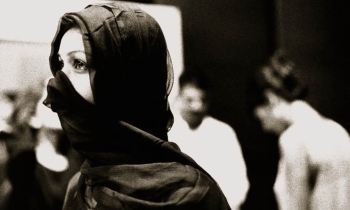When President Bush, Vice President Dick Cheney and several members of Congress recently fired broadsides at The New York Times, the Los Angeles Times and, to a degree, The Wall Street Journal for publishing detailed accounts of a somewhat secret counterterrorism program, it was the mightiest political salvo at the press since Maryland's Spiro T. Agnew threatened the big three television networks and newspaper-dominated mixed media corporations.
"On November 13, 1969, Vice President Spiro T. Agnew became a household word when he vehemently denounced television news broadcasters as a biased 'unelected' elite who subjected President Richard M. Nixon's speeches to instant analysis," begins a chapter on Agnew in the Senate Historical Office's Vice Presidents of the United States. "'The president had a right to communicate directly with the people,' Agnew asserted, without having his words 'characterized through the prejudices of hostile critics. ... '"
Agnew didn't go as far as a few members of Congress have recently gone. At least one senator and one representative charged that the New York Times journalists were "treasonous." But Agnew said something that shook up his targets more than mere cries of treason.
"Agnew," the historical office's biography continued, "raised the possibility of a greater government regulation of 'this virtual monopoly,' a suggestion that the veteran television newscaster Walter Cronkite took 'as an implied threat to freedom of speech in this country.'"
Agnew's November speech was his first as vice president that was not written by two Maryland aides from his governorship days, Cynthia Rosenwald and Herbert Thompson. President Richard M. Nixon's press monitor, Pat Buchanan, did that job.
Rosenwald and Thompson thought it was too strong and got a few changes, but it was still one of the harshest speeches to come out of Washington since Nixon was vice president, when his principal chore was to take the low road while President Eisenhower took the high.
Agnew, it was said, became "Nixon's Nixon" after delivering the first of two anti-media speeches, in Des Moines, Iowa, at a meeting of a Republican regional committee.
Advance word on the speech circulated in the executive suites of ABC, CBS and NBC. All three networks canceled their prime time Thursday schedules to broadcast the speech - even then, a rare occurrence.
I have written elsewhere that that was "the greatest political publicity windfall ever enjoyed by a vice president - an audience estimated by one network official at fifty million."
What the millions heard was immediately seen by many in the news business as both a White House white paper and, as Cronkite put it, a thinly veiled threat.
Nixon had made a nationally televised speech two weeks before Agnew went to Iowa. The president asked the nation to support his Vietnam policy. It was the commentators' remarks afterward that lit the fuse to the Agnew broadside.
Referring to the coverage of Nixon's speech, Agnew said: "When the president completed his address - an address he spent weeks in preparing - his words and policies were subject to instant analysis and querulous criticism. ... While every American has the right to disagree with the president of the United States ... The president of the United States has a right to communicate directly with the people who elected him."
Agnew characterized the commentators as "prejudiced" and "hostile." He said his purpose was to alert the nation to "a little group of men [living in New York or Washington] who read the same newspapers and draw their political views from the same sources. Worse, they talk constantly with one another."
The networks struck back, condemning Agnew in various programming, but the public was on his side. Polls and other public opinion studies by the networks showed Agnew won the battle of words.
NBC, for example, got 1,600 telephone calls criticizing Agnew for his speech, but 1,900 callers agreed with the vice president.
And so, a week later, Agnew went to Montgomery, Ala. for his second media speech. This time, the newspapers were targeted.
Agnew probably enjoyed this White House-generated speech more than his Des Moines attack on the networks. He had a long history of fighting the print press.
Even as Baltimore County executive in the beginning of his political career, he had bitter feuds with and retaliations against critics. When the owner of weeklies in Catonsville and Reisterstown wrote critically of his administration, he cut off the county's official advertising in those papers.
Though he got very positive - and helpful - newspaper editorial endorsements in his gubernatorial campaign in 1966, he soon became a critic of The Sun and The Evening Sun, especially after he accused local civil rights leaders of being responsible for Baltimore riots in the wake of the assassination of the Rev. Martin Luther King Jr. The papers jumped on him.
Then, when he was nominated for vice president, in 1968, commentators in his hometown papers and others elsewhere were less than enthusiastic about his nomination and his candidacy. He was sometimes criticized for fumbling and seen by others as taking the low road in his criticisms of his opponents and their supporters.
Ironically, Agnew's Montgomery speech was, at its core, something many liberal journalists and scholars have worried about.
Agnew warned that there was "a trend toward monopolization of the great public information vehicles and the concentration of more and more power over public opinion in fewer and fewer hands" as newspapers began buying up radio, television, magazines and other newspapers.
Probably because Agnew had become such a lightning rod among liberals, many commentators automatically denounced him and his message in harsh terms. A California senator said it was a part of "a reign of verbal terror against the news media." A New York senator said that if Nixon agreed with Agnew's speech, then "we are in for a grave crisis."
Agnew more or less dropped the subject after Montgomery. In 1970, he attacked liberal "nattering nabobs of negativity," a phrase playfully coined by William Safire, a Nixon speechwriter. But he had made his mark.
Thereafter, the only vice president ever forced to resign because of scandal was better known by many for his assaults on journalists. When he died in Berlin, Md., in 1996, the lead of the Associated Press news story that appeared in hundreds of newspapers began: "Spiro T. Agnew, who relished lashing out at the media ... "
Theo Lippman Jr. is a retired editorial writer for The Sun and the author of "Spiro Agnew's America." His e-mail address is theo@splus.net.









